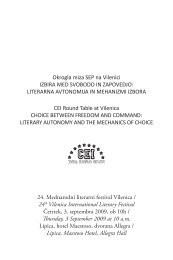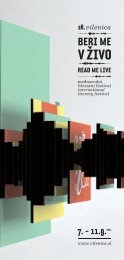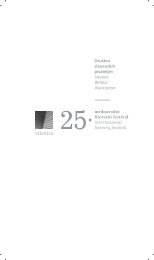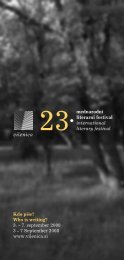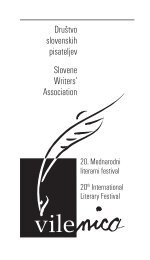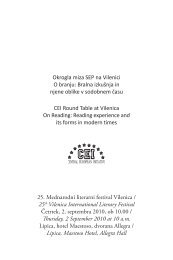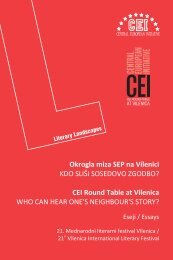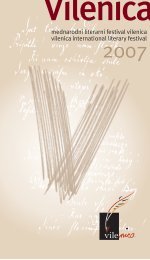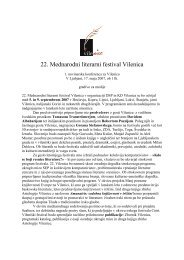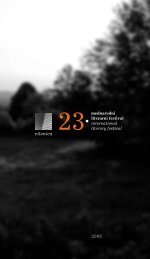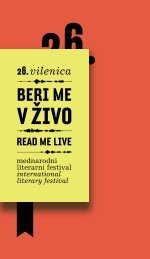Publikacija SEP 2011 - Vilenica
Publikacija SEP 2011 - Vilenica
Publikacija SEP 2011 - Vilenica
You also want an ePaper? Increase the reach of your titles
YUMPU automatically turns print PDFs into web optimized ePapers that Google loves.
ooks owned by someone else. Every library of the solid world depends<br />
on the readings of those who came before us.<br />
Ultimately, this creative hermeneutics defines the reader’s supreme<br />
power: to make of a book whatever one’s experience, taste, intuition<br />
and knowledge dictate. Not just anything, of course, not the concoctions<br />
of a raving mind – even though psychoanalysts and surrealists<br />
suggest that these too have their validity and logic. But rather the<br />
intelligent and inspired reconstruction of the text, using reason and<br />
imagination as best we can to translate it onto a different canvas, extending<br />
the horizon of its apparent meaning beyond its visible borders<br />
and the declared intentions of the author. The limits of this power are<br />
painfully vague: Umberto Eco suggested that they must coincide with<br />
the limits of common sense. Perhaps this arbitration is enough.<br />
Limitless or not, the power of the reader cannot be inherited; it<br />
must be learned. Even though we come into the world as creatures<br />
intent on seeking meaning in everything, in reading meanings in gestures,<br />
sounds, colours and shapes, the deciphering of society’s common<br />
code of communication is a skill that must be acquired. Vocabulary<br />
and syntax, levels of meaning, summary and comparison of texts, all<br />
these are techniques that must be taught to those who enter society’s<br />
commonwealth in order to grant them the full power of reading. And<br />
yet, the last step in the process must be learnt all alone: discovering in<br />
a book the record of one’s own experience.<br />
Rarely, however, is the acquisition of this power encouraged. From<br />
the elite schools of scribes in Mesopotamia to the monasteries and<br />
universities of the Middle Ages, and later, with the wider distribution<br />
of texts after Gutenberg and in the age of the Web, reading at its<br />
fullest has always been the privilege of a few. True: in our time, most<br />
people in the world are superficially literate, able to read an ad and<br />
sign their name on a contract, but that alone does not make them<br />
readers. Reading is the ability to enter a text and explore it to one’s<br />
fullest individual capacities, repossessing it in the act of reinvention.<br />
But a myriad obstacles (as I mentioned in my essay on Pinocchio)<br />
are placed in the way of its accomplishment. Precisely because of the<br />
74



